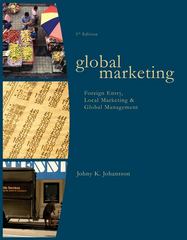Question
Case Study #1 (5%)Time: Due Week 6 ---------------------------------------------------------------------------- Utility(20 Points Total) The objective of this Case Study is to provide students with the opportunity to
Case Study #1 (5%)Time: Due Week 6
----------------------------------------------------------------------------
Utility(20 Points Total)
The objective of this Case Study is to provide students with the opportunity to perform a practical application of Microeconomics. Believe it or not, we use microeconomics in our everyday lives, and I guarantee you that you have used a simplified Utility Analysis before, without even knowing it. How do you make the best choice under conditions of scarcity? How do you get the biggest bang for your buck? We only have a finite amount of resources-we have 24 hours in a day, we have the money we are able to generate through work, but we have endless options to how we use our time or spend our money. How do you choose what's best for you? We look at Utility-a fancy word for the satisfaction or happiness you get from consuming a good or service.
you will be helping a consumer named Jillian chose how to spend her money based on Utility.
Report Expectation
Part 1
Jillian loves going to eat out at restaurants. She enjoys the food, drinks and atmosphere. She has typically always ordered an appetizer, 2 glasses of wine, a main meal and desert. However, the macroeconomy is in an inflationary gap. Prices have increased, interest rates have increased, and her disposable income has decreased. Her financial advisor, Jack, advised her to cut back on her discretionary spending, specifically saying she should stop going out for dinner all the time.
Jillian has a few follow up questions, but unfortunately Jack is on vacation. She needs a smart UCW students help.
After paying her household and living expenses and investing 15% of her paycheck in the stock market, Jillian has $500 a month to spend on having fun. She loves eating out, but also enjoys playing volleyball in a league.
$100 is the maximum amount of money she can spend each time she eats out. Eating out for dinner provides her with the total utility listed below in the table.
Playing Volleyball costs $50 each game and provides her with the total utility listed below in the table.
Which Option below should Jillian choose? What utility will it give her? Map out each option A-F and decide on a final recommendation.
| Option | # of times eating out at Dinner | Total Dinner Cost | Total Dinner Utility | # of Volleyball games | Total Volleyball Costs | Total Volleyball Utility |
A 5
B 4
C 3
D 2
E 1
F 0
Part 2
$500.00 310 0 $400.00 285 2 $300.00 240 4 $200.00 180 6 $100.00 100 8
$0.00 0 10
$0.00 0 $100.00 25 $200.00 75 $300.00 125 $400.00 175 $500.00 225
Jillian can only spend $100 each time she eats dinner out but also realizes, that might be able to save money and spend less than $100 if she decides to change her ordering behaviour.
She used to spend $120 a dinner because she ordered so many menu items. She has asked for your help in determiningwhich dinner menu items she should orderbased on whatMarginal Utility per Total Dollar Spenton each item provides her.
Jillian was kind enough to list out what she typically orders, how much it costs, and how much utility she receives after adding 1 more item to her total order. She has told you that if an item provides herless than 1Marginal Utility per Total Dollar Spent, she does not need to order it.
Complete the table below to help you determine which menu items she should order. Use the description above to help you identify which menu items she should not order.
How much
1 2 3 4 5
will she now spend each time she eats out for dinner?
| Menu Item # | Menu Item Name | Total Utility | Cost / Item | Total Cumulative Dinner Cost | Marginal Utility | Marginal Utility / Total Dollar Spent |
Drink #1 25 $15 Appetizer 55 $20 Main Meal 150 $50 Drink #2 160 $15 Desert 170 $20
$15.00 $35.00 $85.00
$100.00 $120.00
Part 3
Believe it or not, we use Utility Analysis all the time when deciding between options. Have you ever heard of a pros/cons list? Please describe a personal or professional experience where you would use a Utility analysis to help you decide between options. What option did you end up choosing and why?
Step by Step Solution
There are 3 Steps involved in it
Step: 1

Get Instant Access to Expert-Tailored Solutions
See step-by-step solutions with expert insights and AI powered tools for academic success
Step: 2

Step: 3

Ace Your Homework with AI
Get the answers you need in no time with our AI-driven, step-by-step assistance
Get Started


